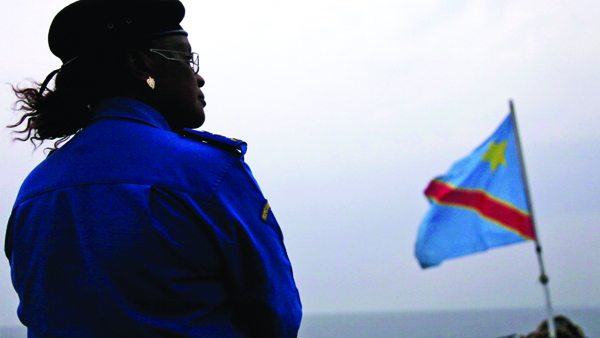Last week, the Museum of Modern Art in New York City kicked off Doc Fortnight 2018, the latest iteration of its annual festival focusing on non-fiction films from around the world. Three entries on this year’s slate hail from Africa, and all share a common theme of providing a voice for those who too often have none, whether they are victims of war, disease, and violence (Liyana); or film industry workers who toil in the background in Sans bruit, les figurants du désert (Noiseless, Desert Extras). In some cases, the film’s main subject acts as the advocate, while in others it’s the filmmakers.
The gritty Mama Colonel offers a powerful character study of a woman in a position of authority in the Democratic Republic of the Congo. At the start, Honorine Munyole is in command of a police division that deals with rapes and child abuse cases, and the public treats her with reverence for her success in locking up rapists. But she is transferred to Kisangani, a city near the DRC’s northeastern border, and this new setting offers challenges unlike any she’s faced.
In Kisangani, Munyole’s first case involves a small child abused by her stepmother. During her interviews with the victim and accused, two traits are readily apparent: her gentleness when dealing with someone who has experienced serious trauma and her sternness toward the accused party, to whom she makes such righteous statements as “You will pay the price for that, even before God.” Throughout these confrontations, Munyole maintains a sense of dignity that stands in sharp contrast with those she brings in for questioning.
Director Dieudo Hamadi follows his subject to a marketplace, where she addresses a crowd about the problem of children being mistreated and implores them to assist sexual assault victims. Interestingly, she never talks down to anyone or tries to win them over with fiery rhetoric. She instead uses cool logic in her arguments: don’t throw your children out into the streets, because you will need them later to care for you when you’re old.
Soon Munyole faces two challenges that prove more daunting. The first is witchcraft, which a segment of the populace believes in and is why much of the child abuse is occurring, and the second involves victims of a nearly two-decades-old struggle, the Six-Day War in 2000, during which men from Uganda and Rwanda invaded the DRC and brutalized its citizens. In pursuing justice for a group of widows, Munyole kicks up a political scrum with other victims of the war, whom the national government recognizes as the only “official” injured parties.
The film is at its best when its protagonist is guided by her empathy, which leads to choices that pay great emotional dividends later. For example, in the case of the widows, who have lost everything and been living on the margins of society, Munyole lets them move into makeshift quarters set up behind the police station. She visits them regularly, offering words of hope about the future. However, in time these women become a community, and eventually, start asking Munyole for improvements to their housing. As she listens patiently, we sense that this is exactly what she hoped would happen.
Tough but fair would be an accurate way to describe Munyole’s style, and Hamadi shows how it applies to suspect and subordinate alike. At one point, when questioning a believer in witchcraft, she doesn’t dismiss his comments outright. However, she does ask him whether he personally witnessed any of the supernatural acts that the children were punished for, such as turning into animals. Munyole also straight-talks the officers under her command from the get-go, warning them that her division is not for the lazy and disinclined. Later, when the unit is outlining the strategy for a raid, she reminds them multiple times that they must seize anything illegal as evidence, not pocket it for themselves.
Mama Colonel is filmed vérité style, and so we experience reality entirely through its subject’s point-of-view. She’s such a strong presence that none of the child abusers she encounters seem worthy of her time; the only opponent that is, is nothing less than the overall sense of apathy throughout the entire city of Kisangani, which, for example, keeps local business owners from donating their time to teach the widows manual labor skills. Munyole makes great strides against this indifference, but the film ends before we really get a chance to see her turn things around.
As we enter an age in which strongmen and despots seem to be crawling out of the woodwork all over the world, this film offers a tantalizing glimpse of another possibility, which might not be so far off.

















Leave A Comment